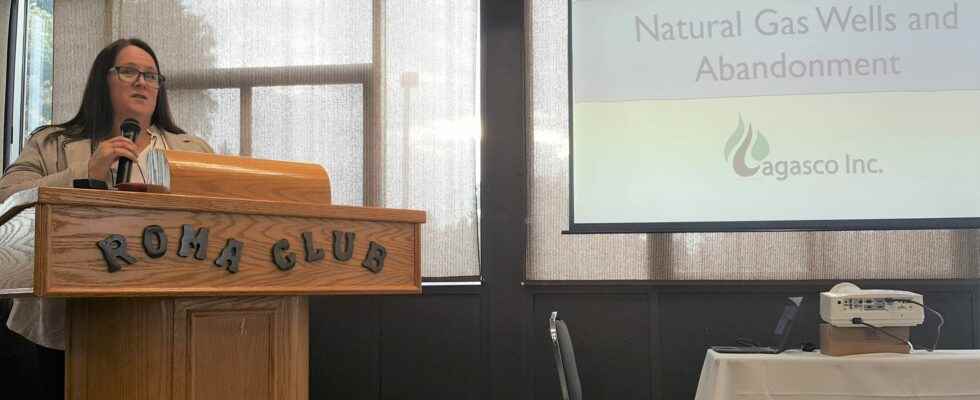
With thousands of orphaned or abandoned gas wells throughout the province, officials hope to continue raising awareness among residents, as well as foster intergovernmental co-operation in tackling the issue.
Chatham-Kent-Leamington MP Dave Epp was host to an Aug. 25 meeting at the Roma Club of Leamington, inviting experts and other officials to share their thoughts on the problem.
Although the event roughly coincided with the one-year anniversary of the Wheatley gas explosion, the presentation was more general in nature, with experts providing an overview, as well as the new techniques for capping these orphaned wells.
Jennifer Barton, assistant deputy minister for Ontario’s Ministry of Natural Resources and Forestry, said there are roughly 27,000 registered wells throughout the province, although the actual number of orphaned wells is unknown.
She said most wells don’t pose a safety risk but acknowledged some older ones could be a conduit for dangerous underground gases to bubble to the surface.
“Understanding your potential risks is really important,” she said. “Hazards associated with oil and gas wells may occur naturally, or they can be the result of operations, of aging infrastructure or some changes to the subsurface.”
Barton said the phrase “abandoned wells” sounds negative but is simply a term that refers to those that have been plugged to ministry standards.
“Tens of thousands of wells have been drilled in Ontario and efficiently here in Southwestern Ontario,” she said.
However, there are other wells of unknown origin due to poor record keeping in earlier days.
Responsibility for wells falls to license holders, lessees or other operators. In absence of that, the responsibility falls to the landowner, Barton added.
“Landowners do need to be diligent in understanding the status of wells that exist on your property,” she said.
Some potential signs of a leak could be soil stains or dying vegetation in the affected area.
Mike Ciacelli, Leamington’s deputy fire chief, said the top priority remains public safety.
Noting the fire department is usually the first point of contact for residents, he urged people to reach out to their local departments with any concerns.
Sometimes gas issues can be confused with sewer or septic problems, Ciacelli noted.
Epp said he hopes for greater co-operation between the federal and provincial governments, as well as more proactive support for property owners, noting his office has had numerous inquiries.
“The interest in this subject has been apparent to us for some time,” he told the gathering.
Epp said he will be continuing to address this issue directly with the federal government when the House of Commons reconvenes in September.
In a statement about the Wheatley anniversary, both Graydon Smith, the provincial minister of natural resources and forestry, and Trevor Jones, MPP for Chatham-Kent–Leamington, said they “recognize how difficult this situation continues to be for those impacted residents, business owners and the broader community.”
They said the work conducted in the wake of the Aug. 26, 2021, explosion in Wheatley’s downtown core was “extremely complex,” but that significant progress was made, noting two area wells have been successfully plugged while work on the third continues.
They also called on the federal government to provide support, consistent with the support they provided to other provinces, to address risks from abandoned wells.
“While much progress has been made, the complexity of the situation requires a methodical approach,” the statement read. “As the investigation continues, Ontario and Chatham-Kent will continue to work to keep people safe while ensuring that remediation of the site happens as quickly as possible.”
Howard Gabert, chair of the Wheatley Task Force, said it’s mostly a provincial matter and criticized what he called “bureaucratic ping-pong” with respect to ultimate responsibility.
He said the problem isn’t going to go away on its own and worries a similar situation might occur in other Southwestern Ontario communities.
Barton said Wheatley posed a “very unique situation” for the province and that officials continue to monitor the issue.
“We do need to step back” and take a look to see if changes are needed, she added.
